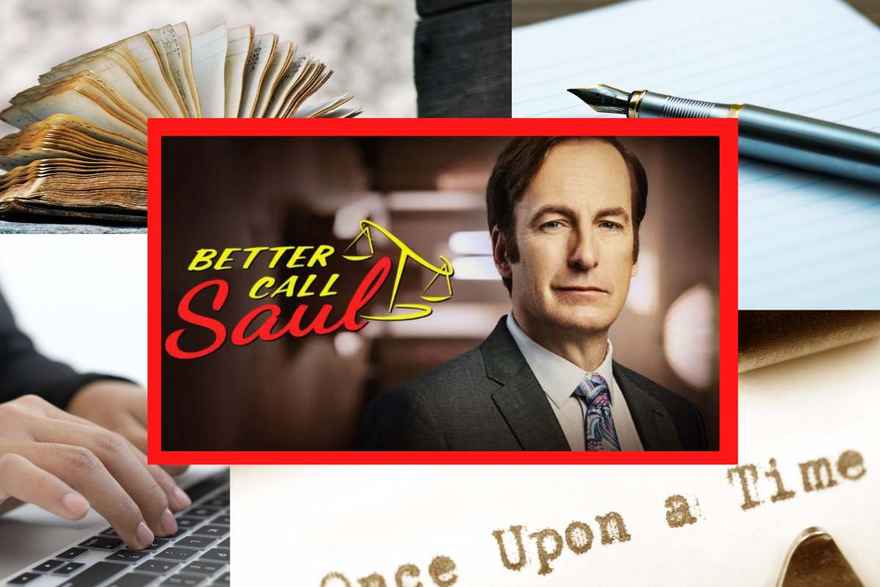Business Lessons from TV: Better Call Saul

Spoiler alerts! Don’t say I didn’t warn you.
As a video storyteller myself, I have my favorites in television and film. There are certain shows that feel like friendships to me. When a series I know and love comes to an end, I feel regret because I'll miss seeing my friends!
Television shows are created, just like the work I do. Basically, it starts with an idea, a strategy session(s) with other people, followed by writing a script and then the visual representation we watch on a screen.
Ever since I discovered the television show, Better Call Saul, the prequel to Breaking Bad, I’ve been obsessed! It’s a bit less gruesome than Breaking Bad so that makes it more palpable for me... and it's such a good story.
I must confess... to have observations about how the series relates to being an entrepreneur, I've watched seasons 1-5 three times! 😬 (P.S. no spoiler alerts for Seasons 6 because I haven't seen it yet!)
So on my third viewing, I asked myself: What is it with this show? Why do I enjoy it so much?
Here's what I came up with...
It's relatable. That's what stories do... they help us relate to each other. Details are unique to individuals but themes are common.
Beyond the details of the main character Jimmy McGill, a shady lawyer who cuts corners and breaks the law himself, he's also a business owner and entrepreneur just trying to make it. He's trying to find out where he belongs. He's on a journey of self discovery to see where he can have the most impact in life and in business. It's the themes in this show I relate to and I think are relatable to others.
So, here are 5 lessons from the main character that anyone who's building their own business outside of a corporate structure will appreciate.
1. He struggles to niche:
When Jimmy is forced to do community service hours, he meets a drug dealer. In desperate need of cash, he strikes a deal to negotiate on the dealer's behalf. This scene comes well into the series. We've already seen Jimmy struggle -- a lot. We've seen him try and fail, again and again. In this moment, he succumbs to the fact that he can help criminals. It's like he finally found his niche!
It takes time to find your niche as a solo entrepreneur. In my experience, finding your niche is a trial-and-error process. And it can be elusive because even when you find a lane that works, it doesn’t mean you’re done.
It doesn’t mean that you’ll never serve any other niche. But it is a sort of groove that you hit in the pavement that has a certain level of smooth to it.
In the show, once he realizes that criminals could be his "ideal client," it's a turning point for him.
2. He fails and pivots:
He’s not good at this... or that. But he has to try in order to find out.
One of the first times he shows his shady side, he's trying to get 2 young skaters to fake a hit and run. He sets this up all because he wants to convince the driver that he should be her lawyer. He's acting as a criminal and it doesn't go as planned. He ends up in an even bigger jam when he has to negotiate for his life! We see him try other set-up scams and it simply doesn't work. He's not a great criminal.
When he does seem to hit success with a cushy job at a big law firm, including housing and a Mercedes as part of the employment package, he's bored. He self sabotages because he doesn't feel he belongs there. He's not good at going 100% legit either.
You see this character evolve and it's that evolution that is so relatable. Failure is, in fact, one of the steps in the entrepreneurial journey. And a frequent pivot, (as I'm learning) is required, common and maybe even necessary.
3. He builds resiliency:
Jimmy builds resiliency throughout the series. He goes from trying to please his brother and be seen as a success in his eyes, to figuratively saying "to hell with it, I'm going to embrace being myself."
You watch the desperation in him. You see the struggle and perseverance. You see failures and flops, humiliation and embarrassment. And finally, you see him break. Upon that break, he embraces being a truer version of himself. And while I don't relate to the ethical compromises he makes to be his true self, the themes are very relatable.
Try, fail, get back up and try again... seems to be story of most every entrepreneur out there. And I have to remind myself of that almost daily!
4. He gets creative:
Jimmy is clearly a creative and strategic thinker. He's creating television commercials and pulling off publicity stunts -- all to build his law practice. When he's forced to work at a cell phone store and finds his location is low-on traffic, he gets creative. He decides it's time to paint a message on the glass to attract new customers... and it works!
This experiment leads him to his next step in business. He later says he thought it was a "waste of time" working there but in fact, it led him to his next step in business! Sound familiar?
It does to me!
I remember having a particularly boring job at one point. Since I refuse to be bored at work, I invented something to do. I saw a need in that when I was hired, there were zero training materials. So, I decided to write a training manual to help those that came after me learn faster on-the-job. No wonder, I later became a trainer and hosted workshops to support ongoing learning.
5. He's in Sales and Embraces it:
When he gets booted from law for a year, he applies to sell copy machines. Having worked in a mailroom previously he clearly has machine experience but when he notices the interviewers don't see "salesperson" on his resume, he quickly works to convince them he's got the chops. (i.e. he sells them on it).
He embraces being a salesman. He's not overt in his selling but he is persuasive. As he points out how, as a lawyer, he was always selling/persuading. He was either selling the judges, his client or the jury.
I've heard so many who are trying to build a business say they don't want to be "salesy." But if you're not doing it, who is?
I think the trick to embracing sales as a business owner, is that you want to feel good about the value you bring and simply share that with people. You don't have to be "pitching" but rather thinking strategically and sharing openly about the good you do in your business.
The Main Take-Away:
The big turning point for the main character in the show is when he quits desperately trying so hard. That's not to say, he quits working. He just quits fighting the uphill battle of doing something the way it's expected to be done.
Instead, he finds his own way that feels right for him.
Jimmy McGill is written as a flawed, yet caring character. He has ups and he has (major) downs. He has struggles and he overcomes them. If the story of the show was written to skip all the struggles what kind of life would that be? Certainly, it wouldn't relate to real life if written that way.
So as much as we want to "get there" with our professional goals, it's not much of a story if you fast forward. It reminds me I want to be more present for every episode of my own journey which will (and does) include struggle. The struggle is how we find our way.
Here's to finding your own way. And letting your story evolve through every chapter and episode of life and business.
And... if you have read this far, maybe you'd be curious to check out how I bring business stories to life. If so, click here: http://uplevelyourvideo.com

0 comments
Leave a comment
Please log in or register to post a comment